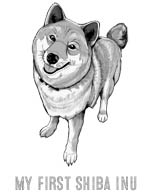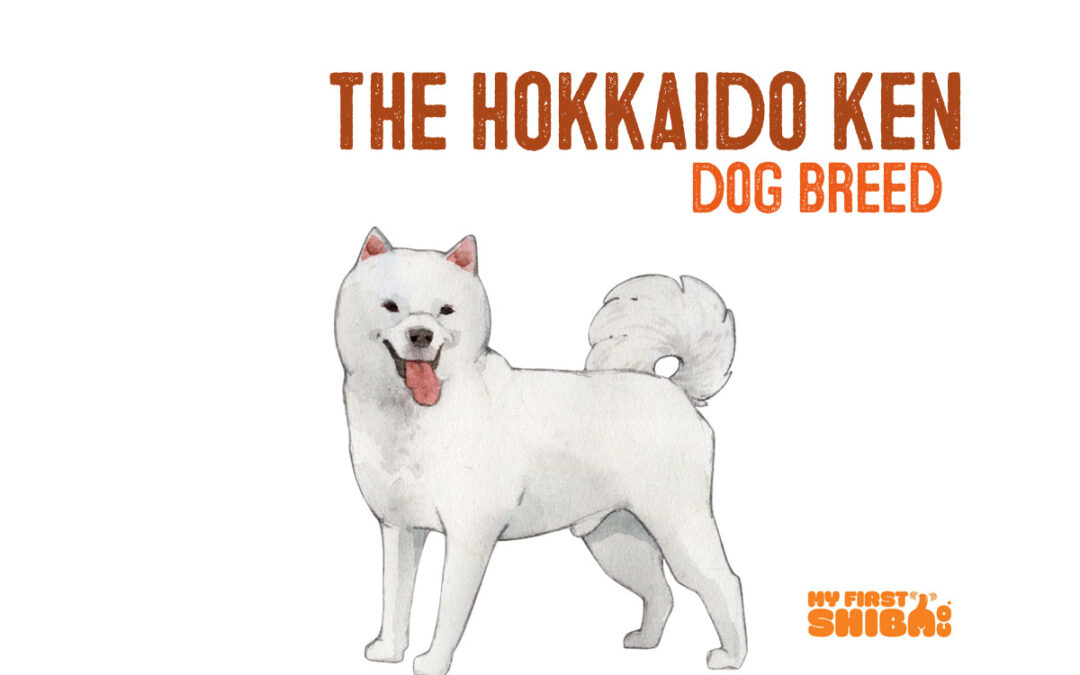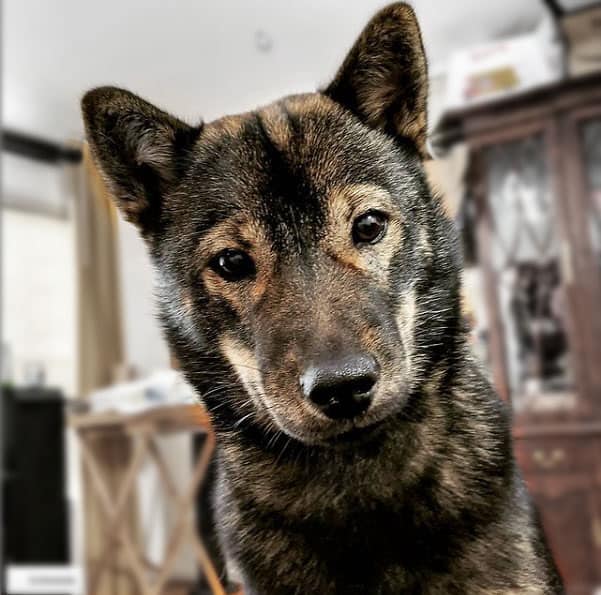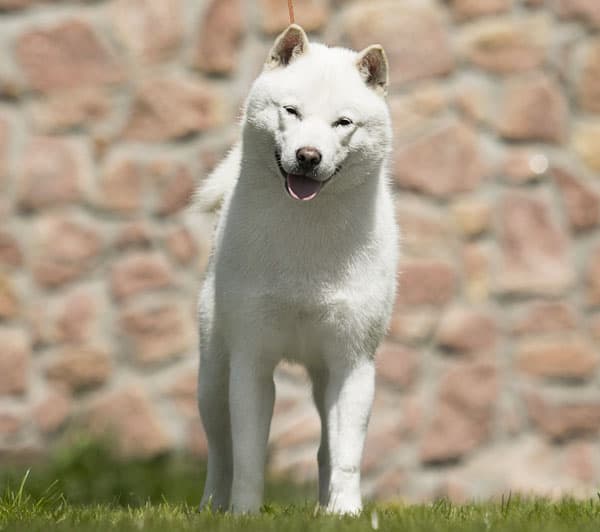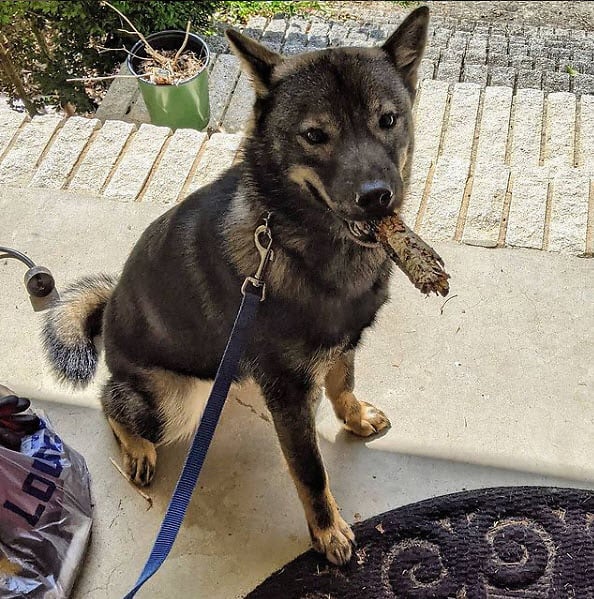On occasion, our posts contain affiliate links. However, we only recommend products that we truly believe in. For more information, visit my privacy policy page.
Is it a Shiba inu, Akita inu, or a Hokkaido inu?
Actually, it's the Hokkaido Ken.
You may have heard of all three, but while Shiba Inus are growing more popular every single day, the dignified Hokkaido Ken is a MUCH rarer find outside of Japan.
In fact, according to the American Kennel Club (AKC), there are only 10,000-12,000 Hokkaido Ken in Japan. The numbers globally are an estimated 1,000 dogs.
If you're interested in Japanese dog breeds like the popular Shiba Inu, it's helpful to learn about other native Japan dog breeds like the Hokkaido Ken. This is because all native Japan dog breeds share similar qualities and characteristics.
So now, let's formally introduce you to the Hokkaido - a patient, bold, and intelligent dog.
Quick Hokkaido Ken Facts:
- Breed group: Working
- Height: 18-22 inches for both males and females
- Lifespan: 12-15 years
- Moderately easy to train
- High amount of shedding but low amount of drool
- Low potential for weight gain
- Moderate wanderlust and stubbornness
The Hokkaido Ken Dog Breed
The Hokkaido Ken is considered a medium-sized breed with strongly built limbs and a compact torso.
Hailing from the northernmost island of Japan, Hokkaido, have long, thick double coats and smaller ears than other Japanese dogs.
Their coats have coarse guard hairs with a fine undercoat that sheds seasonally.
Due to how Hokkaido dogs were originally domesticated, they bear three other names: the Seta, Ainu-ken (ken meaning “breed” in Japanese), and Ainu dog.
Sometimes, the Japanese will shorten the breed name to “Do-ken.” The Ainu are the indigenous people of Hokkaido, though their numbers have dramatically dwindled throughout the years.
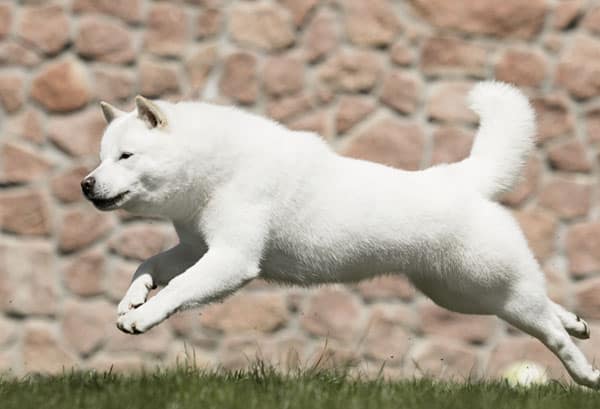
The Hokkaido-ken is known to have a “prey drive,” which is possibly a remnant from their wild dog days.
Though they may give chase to whatever moves in their sight line, they are also extremely intelligent and loyal. They are eager to please and thus easier to train than their stubborn Shiba counterparts.
You will also find that the Hokkaido-ken will live happily in a smaller apartment as long as they get plenty of exercise throughout the day. Hokkaido can be good with children, though early and consistent socialization is crucial.
History of The Hokkaido Dog Breed
The Hokkaido dog is one of the original six dog breeds native to Japan.
They join the Akita, Shikoku, Kai, Kishu, and Shiba inu breeds.
There are records dating back 8,000 years of these dogs accompanying the indigenous Ainu people during the Kamakura period of Japan, around the 1140s.
The Hokkaido Ken evolved to survive in the frigid temperatures and unforgiving landscape of northern Honshu and Hokkaido.
These dogs were capable hunters, helping their humans gather fish, and even much larger prey, such as bears - thus inheriting their nickname "bear-dog".
Since the beginning, the Hokkaido dog’s genetics have been protecting from excessive interbreeding.
Oddly however, many Hokkaido dogs are born with a black and blue tongue, suggesting that there may be some relation to the Shar Pei or Chow Chow breeds.
In 1869, Thomas Blankiston, a British zoologist, officially coined the name Hokkaido dog, and that is how we knew them ever since.
In 1937, the Japanese government designated the breed as a Living Natural Monument.
Currently, there are two breed registries in Japan: the Hokkaido Ken Kyokai (Hokkaido Dog Association) and the Hokkaido Ken Hozonkai (Hokkaido Dog Preservation Association).
Very few Hokkaido dogs are registered in other groups.
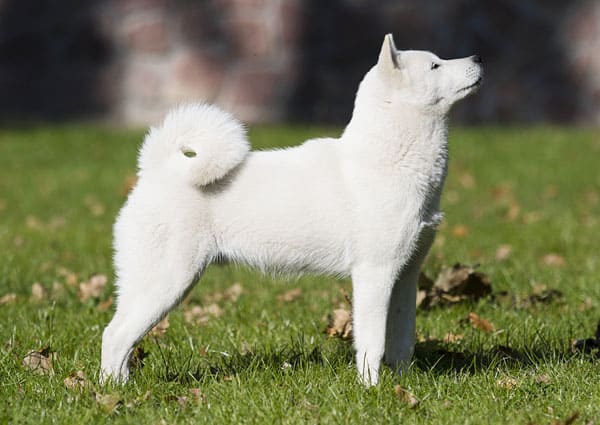
Physical Characteristics
The Hokkaido dog is considered a medium-sized dog that is tough, sturdy, and endowed with excellent bone structure and form.
The Hokkaido is larger and less compact than a Shiba Inu.
Hokkaido dogs boasts powerful chests, strong jaws, and large paws.
These features have undoubtedly aided the Hokkaido in being excellent and fierce hunters.
Standing between 18-20 inches tall with an average weight between 30 - 60 pounds - the Hokkaido is a way more formidable presence than a Shiba Inu.
Females fall on the smaller range of the spectrum with feminine characteristics.
Adaptation from the severe climate of Hokkaido has left modern-day Hokkaido dogs with dense, weatherproof double coats.
The outer coat is short, with coarse guard hairs and their undercoat is soft and plush.
Five distinct coat colors are recognized by NIPPO, UKC, and FCI:
- Red
- White
- Black and Tan
- Brindle
- Sesame
Other acceptable (non-faulted) coat colors include brindle pointed black and tan, pure black, coats with white chest "splashes", and urajiro.
"Sashige" (red with black tips) and cream with red tipping are coat colors that are "acceptable" but not desired.
As with Shiba Inus, pinto colored coats are faulted.
With pointy, prick ears and a 'foxy' face, the Hokkaido, especially reds - closely resemble the Shiba Inu - just a larger and longer version.
The Hokkaido Dog Personality
The Hokkaido Ken is devoted and loyal family-oriented dog. Unlike Shibas, Hokkaido's are highly trainable dogs that aim to please their owners.
Yet, like the Shiba Inu, they are independent and strong-willed.
They need to be handled by the right type of owner who is able to understand the nuances and difficulties of raising an "ancient" basal dog breed.
Hokkaido Kens are active, medium to high energy dogs that need adequate physical and mental stimulation. They'd excel in agility courses, barn hunts, and obedience / trick training.
While Shiba Inus are aloof, Hokkaido's are like their gregarious cousins with a happier, and easier going personality.
Caring for a Hokkaido Ken
Grooming -
Like most ancient dog breeds, the Hokkaido dog needs very little human intervention when it comes to grooming
Their weatherproof coat and the oils from their skin repel dirt and water naturally. They don't need frequent baths and possess very little "doggy odor".
Hokkaido's are a bit less cat-like than Shibas and don't mind getting dirty if it means having fun.
Due to their active nature, their nails should be kept short at all times.
The brushing of their teeth should be incorporated into their daily grooming schedule to prevent gum disease and other oral ailments of dogs.
Nutrition -
Since the Hokkaido breed tends to be rather active, it is recommended that they are fed a balanced diet of carbohydrates, fats, and proteins.
Ideally, we always recommend dogs to be fed, or at least supplemented with fresh human grade foods for optimal health.
However, the meals must always be balanced which many novice dog owners may not be qualified to do.
With the awareness of the dangers of commercial dog foods on the rise, many small companies are fulfilling this need by providing balanced fresh, human grade dog food.
Healthily fed Hokkaido dogs will have shiny, luxurious coats with healthy gums and clean teeth.
Exercise -
The Hokkaido Ken is incredibly active.
In fact, they'll thrive in a family who runs, bikes, hikes, and goes camping.
As a working breed of dog, Hokkaido's should be given regular tasks. This could include obedience training, agility, and similar challenging activities.
Failing to keep an active dog like a Hokkaido physically and mentally engaged could result in a dog that's anxious as well as destructive.
Do not let them run around unattended in the backyard, even if you have a fence. Hokkaido dogs can easily clear a 6 foot tall fence.
Common Health Issues
Although the breed is generally healthy when fed, groomed, and exercised properly, there are some medical conditions that are passed down through the bloodline.
Regular veterinary checkups are key to maintaining the Hokkaido-Ken’s health.
Here are some common hereditary conditions that may ail the breed:
- Pica
- Anxiety
- Hip dysplasia
- Collie eye anomaly
- Heart murmurs
- Luxating patella
- Idiopathic seizures
Hokkaido Ken With Children and Other Pets
The Hokkaido Ken could be a wonderful companion for children of all ages. The key lies in proper socialization and training at a very young age.
The Hokkaido is a devoted family dog that is quite a bit more tolerant of children compared to Shiba Inus.
Hokkaido's have protective instincts that would make them good guardians for younger family members.
However, this description may not apply to "ALL" Hokkaido dogs. As a parent and dog owner, it's your responsibility to assess a dogs suitability for your family.
All dogs can have aggression issues that would make them dangerous to children as well as other animals.
With Other Pets
Because Hokkaido's were once hunting dogs, they may not be too accepting of other pets - especially smaller, "prey-sized" ones.
They can be trained to accept other pets if they've been properly socialized and exposed to many different animals at a young age.
It's much easier for Hokkaido dogs to accept other pets if they grow up with them during their early, formative months.
Sometimes, Hokkaido Ken are perceived by humans as aggressive at play, because they have a crouch-and-pounce style.
However, it is nothing to be concerned about. They are simply enjoying themselves.
Summary
Although the Hokkaido Ken dog breed is extremely rare outside of Japan, it is an excellent dog to consider if you have an interest in Japanese dog breeds.
If you are looking for an energetic, playful, yet patient and loyal companion, the Hokkaido dog is hard to top.
As with any dog breed, it's important to do your research in finding a reputable breeder or rescue.

Thanks for visiting Myfirstshiba.com! We do our very best in providing our readers with awesome content about our beloved Shiba Inu breed. Some of our articles include reviews and recommendations to our favorite products. We do occasionally earn commissions from certain affiliate links that help support our work and mission. Thanks again for visiting. Shiba Kisses To All!
